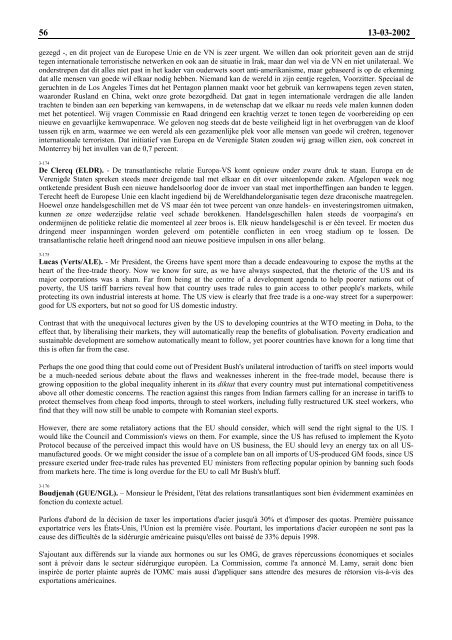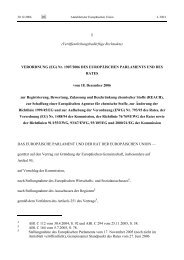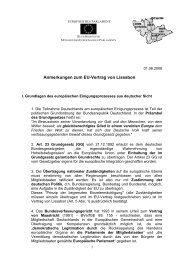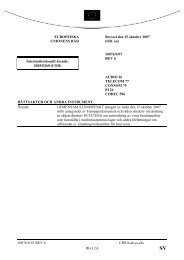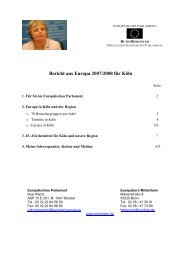mødet onsdag i den 13. marts 2002 sitzung am mittwoch i, 13. märz ...
mødet onsdag i den 13. marts 2002 sitzung am mittwoch i, 13. märz ...
mødet onsdag i den 13. marts 2002 sitzung am mittwoch i, 13. märz ...
Create successful ePaper yourself
Turn your PDF publications into a flip-book with our unique Google optimized e-Paper software.
56 13-03-<strong>2002</strong><br />
gezegd -, en dit project van de Europese Unie en de VN is zeer urgent. We willen dan ook prioriteit geven aan de strijd<br />
tegen internationale terroristische netwerken en ook aan de situatie in Irak, maar dan wel via de VN en niet unilateraal. We<br />
onderstrepen dat dit alles niet past in het kader van ouderwets soort anti-<strong>am</strong>erikanisme, maar gebaseerd is op de erkenning<br />
dat alle mensen van goede wil elkaar nodig hebben. Niemand kan de wereld in zijn eentje regelen, Voorzitter. Speciaal de<br />
geruchten in de Los Angeles Times dat het Pentagon plannen maakt voor het gebruik van kernwapens tegen zeven staten,<br />
waaronder Rusland en China, wekt onze grote bezorgdheid. Dat gaat in tegen internationale verdragen die alle lan<strong>den</strong><br />
trachten te bin<strong>den</strong> aan een beperking van kernwapens, in de wetenschap dat we elkaar nu reeds vele malen kunnen do<strong>den</strong><br />
met het potentieel. Wij vragen Commissie en Raad dringend een krachtig verzet te tonen tegen de voorbereiding op een<br />
nieuwe en gevaarlijke kernwapenrace. We geloven nog steeds dat de beste veiligheid ligt in het overbruggen van de kloof<br />
tussen rijk en arm, waarmee we een wereld als een gez<strong>am</strong>enlijke plek voor alle mensen van goede wil creëren, tegenover<br />
internationale terroristen. Dat initiatief van Europa en de Verenigde Staten zou<strong>den</strong> wij graag willen zien, ook concreet in<br />
Monterrey bij het invullen van de 0,7 percent.<br />
3-174<br />
De Clercq (ELDR). - De transatlantische relatie Europa-VS komt opnieuw onder zware druk te staan. Europa en de<br />
Verenigde Staten spreken steeds meer dreigende taal met elkaar en dit over uiteenlopende zaken. Afgelopen week nog<br />
ontketende presi<strong>den</strong>t Bush een nieuwe handelsoorlog door de invoer van staal met importheffingen aan ban<strong>den</strong> te leggen.<br />
Terecht heeft de Europese Unie een klacht ingediend bij de Wereldhandelorganisatie tegen deze draconische maatregelen.<br />
Hoewel onze handelsgeschillen met de VS maar één tot twee percent van onze handels- en investeringstromen uitmaken,<br />
kunnen ze onze wederzijdse relatie veel schade berokkenen. Handelsgeschillen halen steeds de voorpagina's en<br />
ondermijnen de politieke relatie die momenteel al zeer broos is. Elk nieuw handelsgeschil is er één teveel. Er moeten dus<br />
dringend meer inspanningen wor<strong>den</strong> geleverd om potentiële conflicten in een vroeg stadium op te lossen. De<br />
transatlantische relatie heeft dringend nood aan nieuwe positieve impulsen in ons aller belang.<br />
3-175<br />
Lucas (Verts/ALE). - Mr Presi<strong>den</strong>t, the Greens have spent more than a decade endeavouring to expose the myths at the<br />
heart of the free-trade theory. Now we know for sure, as we have always suspected, that the rhetoric of the US and its<br />
major corporations was a sh<strong>am</strong>. Far from being at the centre of a development agenda to help poorer nations out of<br />
poverty, the US tariff barriers reveal how that country uses trade rules to gain access to other people's markets, while<br />
protecting its own industrial interests at home. The US view is clearly that free trade is a one-way street for a superpower:<br />
good for US exporters, but not so good for US domestic industry.<br />
Contrast that with the unequivocal lectures given by the US to developing countries at the WTO meeting in Doha, to the<br />
effect that, by liberalising their markets, they will automatically reap the benefits of globalisation. Poverty eradication and<br />
sustainable development are somehow automatically meant to follow, yet poorer countries have known for a long time that<br />
this is often far from the case.<br />
Perhaps the one good thing that could come out of Presi<strong>den</strong>t Bush's unilateral introduction of tariffs on steel imports would<br />
be a much-needed serious debate about the flaws and weaknesses inherent in the free-trade model, because there is<br />
growing opposition to the global inequality inherent in its diktat that every country must put international competitiveness<br />
above all other domestic concerns. The reaction against this ranges from Indian farmers calling for an increase in tariffs to<br />
protect themselves from cheap food imports, through to steel workers, including fully restructured UK steel workers, who<br />
find that they will now still be unable to compete with Romanian steel exports.<br />
However, there are some retaliatory actions that the EU should consider, which will send the right signal to the US. I<br />
would like the Council and Commission's views on them. For ex<strong>am</strong>ple, since the US has refused to implement the Kyoto<br />
Protocol because of the perceived impact this would have on US business, the EU should levy an energy tax on all USmanufactured<br />
goods. Or we might consider the issue of a complete ban on all imports of US-produced GM foods, since US<br />
pressure exerted under free-trade rules has prevented EU ministers from reflecting popular opinion by banning such foods<br />
from markets here. The time is long overdue for the EU to call Mr Bush's bluff.<br />
3-176<br />
Boudjenah (GUE/NGL). – Monsieur le Prési<strong>den</strong>t, l'état des relations transatlantiques sont bien évidemment ex<strong>am</strong>inées en<br />
fonction du contexte actuel.<br />
Parlons d'abord de la décision de taxer les importations d'acier jusqu'à 30% et d'imposer des quotas. Première puissance<br />
exportatrice vers les États-Unis, l'Union est la première visée. Pourtant, les importations d'acier européen ne sont pas la<br />
cause des difficultés de la sidérurgie <strong>am</strong>éricaine puisqu'elles ont baissé de 33% depuis 1998.<br />
S'ajoutant aux différends sur la viande aux hormones ou sur les OMG, de graves répercussions économiques et sociales<br />
sont à prévoir dans le secteur sidérurgique européen. La Commission, comme l'a annoncé M. L<strong>am</strong>y, serait donc bien<br />
inspirée de porter plainte auprès de l'OMC mais aussi d'appliquer sans attendre des mesures de rétorsion vis-à-vis des<br />
exportations <strong>am</strong>éricaines.


